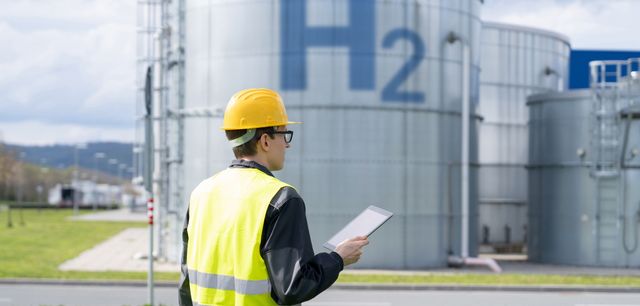24 October 2024
Green hydrogen is going to be indispensable for reducing CO2 emissions in the steel industry or from heavy goods transport, for example. TÜV NORD experts now have a new seal at their disposal to certify existing pipelines or planned gas-fired power plants as meeting the requirements for future operation using hydrogen. In this interview, Malte Hübner from TÜV NORD Systems explains what H2 readiness entails and how it is tested.
Mr. Hübner, what is meant by H2 readiness?
Malte Hübner: H2 readiness is shorthand for the suitability of plants or pipelines to be operated safely and efficiently using hydrogen. This can mean, for example, that the materials or components used are sufficiently corrosion-resistant. Or that appropriate sensors and safety devices have been installed to minimise possible risks in the handling of hydrogen.
TÜV NORD has a new seal at its disposal to certify this. What areas does it cover?
Manufacturers and operators in various industrial sectors can use the seal to prove to their customers, the public or government funding bodies that their plans, projects or products are compatible with hydrogen: these range from the production of hydrogen by electrolysis to its storage in pressure vessels or underground gas storage facilities. However, our experts also look at the safety of transporting hydrogen by ship, truck or pipeline as well as its use in gas-fired power plants, fuel cells or tank systems.
© Adobe StockRefuelling with green hydrogen - the experts at TÜV NORD are also looking at the safety of use in refuelling systems.
How do you determine suitability for hydrogen use?
First of all, we get the technical specifications of the planned plant or project from the manufacturers or operators. In the first step, we then look at which departments need to be involved in the certification in question: Do you need someone who specialises in pressure equipment, or a specialist from the fields of electromagnetic compatibility or explosion protection or possibly even from the functional safety field? The colleagues concerned then get further information from the companies and carry out the necessary checks according to the norms and standards relevant to these areas. If all the requirements can be shown to have been met, the relevant certificate is issued. Plans and projects are certified once only. The certificates for production plants last for five years, with annual monitoring.
About Malte Hübner:
Malte Hübner is a project manager at TÜV NORD Systems. The industrial engineer was one of the initiators of the H2 Readiness seal, and his work includes such things as the possible deployment of remote inspections.





